Photographs: Reuters Sharad Joshi
Finance Minister Pranab Mukherjee was scheduled to hold the pre-Budget discussions with the stakeholders in agriculture on January 7, 2010.
This is the first time that the agriculture sector had got precedence over all other sectors in the annual round of pre-Budget discussions showing what the media has been asserting for weeks that the finance minister is concerned about inflation, particularly the flight of commodity prices and that his ministry was in tears caused by high onion prices.
The finance minister is not an economist by profession. However, his experience in finance and commerce and other economic ministries is so extensive that he could well shed the air of injured innocence at the unprecedented inflation, particularly in farm produce.
Firstly, inflation is not exclusively an Indian phenomenon. China is reeling under the same rate of inflation of over 18 per cent. Many other countries are facing the same quandary. The continuous rise in petroleum prices by itself was enough to make inflation a global phenomenon.
Why then are the United Progressive Allianec leaders feigning surprise at the harvest, the seeds of which they so assiduously sowed since 2004 and drew a bonanza of political benefit in two successive general elections?
. . .
How UPA policies have hurt farmers, agriculture
Photographs: Reuters
Pratibha Patil, the President of the Republic, herself in her last year's address to the two Houses of Parliament admitted that the 'aam adami policies' were causing inflation.
She is no economist either, but has the uncanny astuteness of a housewife to see what could come out of the pump-priming in the form of the flagship schemes of her government.
Putting more money in the hands of the consumer is by itself not a bad thing if it is accompanied by other measures that promote production. The industry is booming. Understandably, there is no public outcry on tertiary goods inflation.
Till the end of 2010, agriculture showed negative rate of growth and the government has been trying its best to disincentivise farming.
The farmer continues to be burdened by debts, both from banks and other institutions. The number of suicides in 2009 was 1,200 higher than in 2008 and just about on par with the average of post-1997 period.
. . .
How UPA policies have hurt farmers, agriculture
Photographs: Reuters
The Debt Relief and Loan Waiver (DRLW) Scheme 2008 has clearly been a scam comparable with the 2G spectrum imbroglio for which the government is refusing to initiate an inquiry by a JPC.
Electricity is the largest single item of farm expenditure; the DRLW Scheme ignored the power dues altogether. The farmers continue to be defaulters on this account.
The state electricity boards in several states are carrying out a ruthless campaign of cutting off supply of defaulters as also non-defaulters. The government could hardly take it as a measure for improving food security.
Farm power is being cut off just when the petroleum prices are becoming prohibitive, making it impossible for the farmers to go back to good old diesel pumps.
The UPA government has failed to unlink the Indian economy from the global rise in petroleum prices by encouraging Brazil-like farm production of bio-fuels.
. . .
How UPA policies have hurt farmers, agriculture
Photographs: Reuters
The situation of the farmers has become even more precarious because of the wage costs that have gone up 60 times since 1980 when we had the first onion crisis. Further, the free lunch schemes of UPA are fostering an ethos of indolence that has made the historic hard working peasant evaporate into thin air.
Though global warming has exploded in the face of the environmentalists, climate frailty is coming out to be far more dangerous to agricultural production.
Last year we had devastation by drought; this year, the unseasonal precipitations and cloudbursts are causing mass destruction of crops and an unprecedented supply crunch.
The most significant contribution to the inflation comes from the mismanagement of the situation by the administration. Firstly, as in the case of confrontations with the enemies and the Naxalites, is the colossal failure of intelligence in respect of crop estimates.
The precise consequences of the unseasonal rains on onion crops should have been clear at least three months earlier. The tidings were blinked at as just another move of the onion producers to get compensation.
. . .
How UPA policies have hurt farmers, agriculture
Photographs: Reuters
Further, there is lack of common sense. It is common knowledge that the Nashik varieties (of onion) 'Rangda' and 'Pol' do not lend themselves to storage. The entire bulb starts deteriorating within a week or so.
Too much time was wasted in chasing wild gooses because of the basic casteist bias against a class that does trading, processing and storage. Petty stocks of onions were seized and brought out with exaggerated publicity and fanfare.
Lastly, there was the systemic failure. If the futures markets were the default marketing channel rather than the APMC, most of the stocks would have been in the warehouses of the commodity exchanges and there needed to be no wild goose chasing.
Last, but not the least, was the failure of market intelligence. It is common knowledge that prices of onions the world over are much higher than what Indians consider as exorbitant.
The only exception is Pakistan which produces more or less the same varieties and offers competition to Indian onion in the ethnic markets in the Middle East, as also south East Asia.
. . .
How UPA policies have hurt farmers, agriculture
Photographs: Reuters
It was quite obvious that the ban on export of onions and facilitating imports could only militate to the advantage of Pakistan. Fortunately, so far consignments of onion containers have not been used by Al Qaeda contingents.
There is considerable unrest in the farming community at the news that the government intends to complete the incomplete agenda on land reforms and reduce their agricultural land ceilings to 2 acres of irrigated land and 5 acres of dry land.
The chronic economic predicament of the farmers along with inimical state policies and vagaries of climate will soon create a situation where it will be difficult to have food stocks necessary for the food security plans of the government.
The finance minister will have to take the lead and initiate policies that will make agriculture turn the crucial corner.
The author is the founder of Shetkari Sanghatana and a former Member of Parliament (Rajya Sabha).

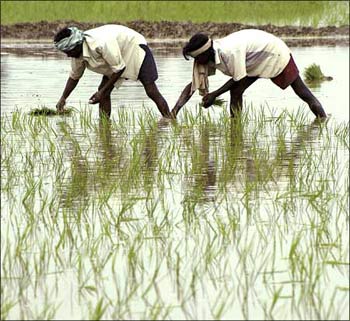
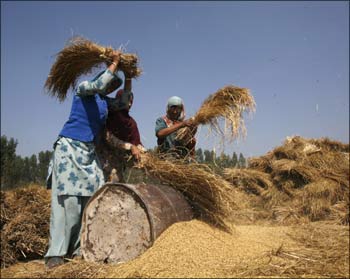
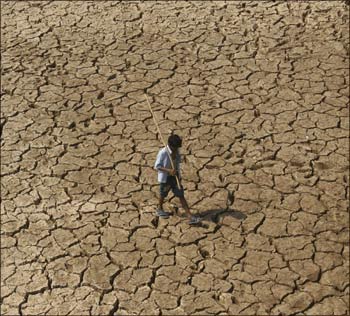
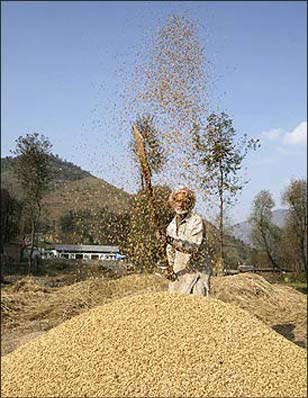
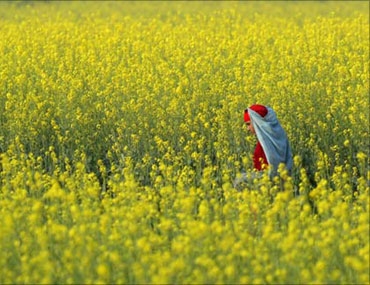
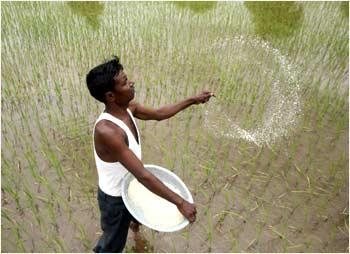
article